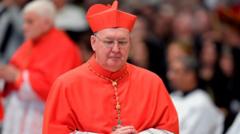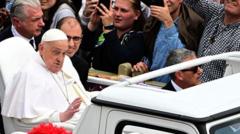Pope Francis, who passed away at the age of 88, leaves behind a profound legacy centered on support for the poor and marginalized, global climate action, and interfaith understanding. His death has prompted a wave of tributes from around the world, as leaders and citizens alike reflect on his teachings and compassionate outreach during his papacy.
The World Bids Farewell to Pope Francis: A Legacy of Compassion and Inclusion

The World Bids Farewell to Pope Francis: A Legacy of Compassion and Inclusion
Global leaders and clergy mourn the passing of Pope Francis, reflecting on his 12 years of transformative leadership focused on compassion for the marginalized, interfaith dialogue, and climate action.
April 21, 2025, Vatican City — With the setting sun casting a warm glow over St. Peter’s Square, a sea of mourners gathered to pay their respects following the announcement of Pope Francis' death at age 88. The Vatican, in a solemn message, confirmed that the religious leader had departed for “the house of the Father,” facilitating an outpouring of grief from around the globe. Leaders praised his unwavering commitment to the disenfranchised, highlighting an accessible and inclusive vision for the Roman Catholic Church.
Pope Francis was renowned for advocating on behalf of migrants, the impoverished, and marginalized communities during his 12-year pontificate. Emerging from modest origins in Argentina, he set out to remake the Church into a more welcoming and compassionate institution that prioritized social justice. His unexpected passing the day after delivering an Easter blessing from his wheelchair left many in shock, prompting swift gatherings in St. Peter’s Square where the air was thick with sorrow.
In his final public comments, the late pope pressed for urgency in alleviating the suffering of the marginalized, a consistent thread throughout his papacy. “How much contempt is stirred up at times towards the vulnerable, the marginalized, and migrants!" were among his last calls for compassion toward the needy, emphasizing the need for communities to extend support to those different from themselves.
A new era dawns for the Church as Cardinals prepare for a conclave to elect Pope Francis’ successor — an undertaking that will test the foundations of his legacy. Cardinal Kevin Farrell, the acting administrator of the Vatican, will oversee this transitional period. Initial speculations suggest there may be a battle between factions favoring a progressive agenda and those advocating a return to traditional conservatism.
Tributes have been plentiful as leaders from across the globe have shared their condolences. Former U.S. President Barack Obama described Francis as a leader who encouraged global moral responsibilities while expressing disappointment that hardly anyone matched his rare intersection of compassion and courage. Furthermore, leaders in Mexico, Canada, and Argentina echoed sentiments about the pope's deep-rooted dedication to the poor and emphasis on social justice.
Public observances have sprung up, with masses and gatherings designed to commemorate his impactful life. Many citizens have expressed a longing for a successor who will continue his work, especially in promoting inclusivity and addressing pressing social issues. Regarding the potential candidates, discussions have emerged, hinting at the diverse pool of both innovative and traditional options within the College of Cardinals.
As the world reflects on the guiding principles of Pope Francis, the call for dignity, equality, and respect for all may well serve as his enduring legacy—urging those in power to recognize and support the vulnerabilities of many, shaping the path forward for the Catholic Church and beyond.
Pope Francis was renowned for advocating on behalf of migrants, the impoverished, and marginalized communities during his 12-year pontificate. Emerging from modest origins in Argentina, he set out to remake the Church into a more welcoming and compassionate institution that prioritized social justice. His unexpected passing the day after delivering an Easter blessing from his wheelchair left many in shock, prompting swift gatherings in St. Peter’s Square where the air was thick with sorrow.
In his final public comments, the late pope pressed for urgency in alleviating the suffering of the marginalized, a consistent thread throughout his papacy. “How much contempt is stirred up at times towards the vulnerable, the marginalized, and migrants!" were among his last calls for compassion toward the needy, emphasizing the need for communities to extend support to those different from themselves.
A new era dawns for the Church as Cardinals prepare for a conclave to elect Pope Francis’ successor — an undertaking that will test the foundations of his legacy. Cardinal Kevin Farrell, the acting administrator of the Vatican, will oversee this transitional period. Initial speculations suggest there may be a battle between factions favoring a progressive agenda and those advocating a return to traditional conservatism.
Tributes have been plentiful as leaders from across the globe have shared their condolences. Former U.S. President Barack Obama described Francis as a leader who encouraged global moral responsibilities while expressing disappointment that hardly anyone matched his rare intersection of compassion and courage. Furthermore, leaders in Mexico, Canada, and Argentina echoed sentiments about the pope's deep-rooted dedication to the poor and emphasis on social justice.
Public observances have sprung up, with masses and gatherings designed to commemorate his impactful life. Many citizens have expressed a longing for a successor who will continue his work, especially in promoting inclusivity and addressing pressing social issues. Regarding the potential candidates, discussions have emerged, hinting at the diverse pool of both innovative and traditional options within the College of Cardinals.
As the world reflects on the guiding principles of Pope Francis, the call for dignity, equality, and respect for all may well serve as his enduring legacy—urging those in power to recognize and support the vulnerabilities of many, shaping the path forward for the Catholic Church and beyond.






















